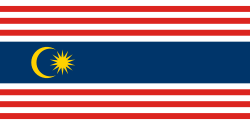Flags of Asia

This article needs additional citations for verification. (March 2025) |
This is a list of international, national and subnational flags used in Asia.
Supranational and international flags
[edit]An incomplete list of flags representing intra-Asian international and supranational organisations, which omits intercontinental organisations such as the United Nations:
| Flag | Date | Use | Description |
|---|---|---|---|
 |
1945 – | Flag of the Arab League | The flag of the League of Arab States is two olive branches and 22 chain-links encircling a crescent and the name of the organisation (written in Arabic).
The Arab League is an organization made up of countries in the Arab world in Northern Africa and Southwest Asia. Most, though not all of these countries use Arabic as their official language and concreted on Mediterranean sea and Arabian sea countries. The purpose is to find ways for the countries to have unity and to work together to solve their problems. |
 (flag image subject to copyright restrictions) (flag image subject to copyright restrictions) |
1997 – | Flag of the Association of Southeast Asian Nations | The flag of the Association of Southeast Asian Nations is blue with the emblem of the organisation in the center. The Association of Southeast Asian Nations (ASEAN) is an international organization.
In August 1967, Malaysia, Thailand, Indonesia, Singapore, and the Philippines formed the ASEAN. At that time, communism was growing in Vietnam, and these five countries were also facing problems inside their own countries. Nowadays ASEAN consists of ten countries, the latter and Brunei, Cambodia, Laos, Vietnam and Myanmar. |
 |
1991 – | Flag of the Commonwealth of Independent States | The flag of the Commonwealth of Independent States is blue with the emblem of the organisation in the centre. |
 |
1981 – | Flag of the Cooperation Council for the Arab States of the Gulf | Originally (and still colloquially) known as the Gulf Cooperation Council (GCC; Arabic: مجلس التعاون الخليجي), is a regional, intergovernmental political and economic union that consists of five Arabian peninsula countries except Yemen. |
 |
2011 – | Flag of the Organisation of Islamic Cooperation | The flag of the Organisation of Islamic Cooperation is white with a green crescent and globe, with the Kaaba at the center of the globe. The Organisation of Islamic Cooperation is an international group. It has over 55 member states. The organisation tries to be the voice of the Muslim world. They try to safeguard the interests and the progress and well-being of Muslims. |
 |
1960 – | Flag of the Organization of the Petroleum Exporting Countries | The Flag of the Organization of the Petroleum Exporting Countries is a blue background with the acronym 'OPEC' in stylized white lettering. OPEC, the Organization of the Petroleum Exporting Countries is an international organization. Since 1965, the headquarters of OPEC has been in Vienna, Austria. OPEC was established in September 1960 in Baghdad, Iraq. |
 |
2024 – | Flag of the Organization of Turkic States | The flag combines the symbols of the original four members: the light blue color of the flag of Kazakhstan, the sun of the flag of Kyrgyzstan, the star of the flag of Azerbaijan and the crescent of the Turkish flag. |
Flags of Asian sovereign states
[edit]| Flag | Date | Use | Description | Ref. |
|---|---|---|---|---|
 |
1997 – 2001 2021 – |
Flag of Afghanistan | Originally adopted in 1997 and readopted in 2021, the flag of the Islamic Emirate of Afghanistan has the Shahada in black on a white background. | |
 |
1918 – 1920 1991 – |
Flag of Armenia[a] See also: List of Armenian flags |
After gaining independence, the First Republic of Armenia adopted the modern Armenian tricolor. The independent Armenian government selected the colours used during the last period of Rubenid Dynasty, red, blue and yellow. The red emblematizes the Armenian Highland, the Armenian people's continued struggle for survival, maintenance of the Christian faith, Armenia's independence and freedom. The blue emblematizes the will of the people of Armenia to live beneath peaceful skies. The orange emblematizes the creative talent and hard-working nature of the people of Armenia. | |
 |
1918 – 1920 1991 – |
Flag of Azerbaijan[a] See also: List of Azerbaijani flags |
Originally adopted in 1918 as the flag of the Democratic Republic of Azerbaijan, was officially adopted again in 1991, after Azerbaijan gained its independence.
The flag of Azerbaijan is the national ensign of Azerbaijan. It consists of three equal horizontal bands colored blue, red, and green, with a white crescent and an eight-pointed star are centered in the red band. The blue band refers to Turkic heritage, the red is for progress and the green refers to Islam. |
|
 |
2002 – | Flag of Bahrain | Adopted in February 2002, the flag of Bahrain consists of a white band on the hoist, with red on the right. They are separated by five triangles forming a serrated line. | |
 |
1972 – | Flag of Bangladesh See also: List of Bangladeshi flags |
Adopted in January 1972, the flag of Bangladesh consists of a slightly off-center red disc over a green field. | |
 |
1969 – | Flag of Bhutan | Adopted in 1969, the flag of Bhutan consists of a diagonally-divided field, the upper left yellow and the lower right orange. Along the diagonal line is a white dragon, the Druk (Thunder Dragon), holding jewels in its claws. | |
 |
1959 – | Flag of Brunei | Adopted in September 1959, the flag of Brunei consists of a yellow field divided by diagonal black and white stripes; superimposed over it is Brunei's crest, featuring a crescent facing upwards surrounded by hands and a parasol, all in red. | |
 |
1948 – 1970 1993 – |
Flag of Cambodia See also: List of Cambodian flags |
Adopted in 1993 and previously used between 1948 and 1970,[citation needed] the flag of Cambodia consists of a horizontal tricolor of blue, red (double width) and blue, with a white depiction of Angkor Wat in the center of the red band. | [1] |
 |
1949 – | Flag of China See also: List of Chinese flags |
Adopted in September 1949, the flag of China consists of a red field with five gold stars in the canton; one large star is surrounded by four smaller stars surrounded in a semicircle and set off towards the fly. | |
 |
1960 – | Flag of Cyprus[b] | The flag was officially adopted on August 16, 1960.
The island is depicted in a copper shade representative of its name; the name Cyprus has roots in the Sumerian word for copper (zubar) from the large deposits of copper found on the island. The crossed green olive branches symbolise the hope for peace between the Turks and the Greeks. It was designed by İsmet Güney, a Turkish Cypriot painter. |
|
 |
1984 – | Flag of Egypt[f] | Adopted in October 1984, the flag of Egypt consists of a horizontal tricolor of red, white and black, with the eagle of Saladin in the center of the white band. | |
 |
2004 – | Flag of Georgia[a] See also: List of flags of Georgia (country) |
This recently adopted flag is a simple white rectangle, with a central red cross connecting all four sides of the flag; in each of the four corners is a small red cross. The flag is based on a historic five-cross design that dates back to the 14th century. | |
 |
1947 – | Flag of India See also: List of Indian flags |
Adopted in July 1947, the flag of India consists of a horizontal tricolour of saffron, white and green; in the centre of the white band is a 24-spoke wheel (the Ashoka Chakra) coloured in navy blue. | |
 |
1945 – | Flag of Indonesia See also: List of Indonesian flags |
Adopted in August 1945, the flag of Indonesia consists of a bicolour; red on the top, white on the bottom. | |
 |
1980 – | Flag of Iran See also: List of Iranian flags |
Adopted in July 1980, the flag of Iran consists of a horizontal tricolor of green, white and red; the country's national emblem ("Allah") in red is centered on the white band; and the takbir (as written in the Kufic script) is written 11 times on each band in white. | |
 |
2008 – | Flag of Iraq | Adopted in January 2008, the flag of Iraq consists of a horizontal tricolor of red, white and black; in the center of the white stripe is the takbir written in green Kufic script. | |
 |
1948 – | Flag of Israel See also: List of flags of Israel |
Adopted in October 1948, the flag of Israel consists of a blue star of David, surrounded by two blue horizontal stripes, all over a white field. | |
 |
1870 – | Flag of Japan See also: List of Japanese flags |
Adopted as a civil ensign on February 27, 1870, Adopted as a national flag on August 13, 1999. The flag consists of a white background with a red circle representing the sun. | |
 |
1928 – | Flag of Jordan | Adopted in April 1928, the flag of Jordan is a horizontal tricolor with a red chevron, the colors used are the Pan-Arab colors. | |
 |
1992 – | Flag of Kazakhstan[d] See also: List of Kazakh flags |
Adopted on June 4, 1992, the flag has a gold sun with 32 rays above a soaring golden steppe eagle, both centered on a sky blue background; the hoist side displays a national ornamental pattern called "koshkar-muiz" (the horns of the ram) in gold. | |
 |
1961 – | Flag of Kuwait | Adopted in 1961, uses the Pan-Arab colors. | |
 |
2023 – | Flag of Kyrgyzstan | The flag of Kyrgyzstan consists of a red field with a yellow stylized yurt with the 40 rays which resembles the number of tribes united by Manas (a Kyrgyz national hero) to fight against the Mongols. The current flag was adopted in 2023 due to reduce its resemblance to a sunflower. | |
 |
1945 –1946 1975 – |
Flag of Laos | The flag has 3 horizontal bands, with the middle band being blue and the rest being red. It has a white circle in the center symbolizing the full moon over the Mekong River. | |
 |
1943 – | Flag of Lebanon | ||
 |
1950 – | Flag of Malaysia See also: List of Malaysian flags |
Adopted on May 26, 1950, the flag has fourteen horizontal stripes, alternating between red and white, represents the equalness of the Malaysia's 13 member states; and in the canton, a yellow crescent representing Islam, and a 14-point star representing unity among their member states, all of which on a blue field. | |
 |
1965 – | Flag of Maldives | The flag has a green field with a red outline and a crescent in the center. | |
 |
1945 – | Flag of Mongolia | The flag of Mongolia consists of a vertical bicolor triband with the colors red, blue and red with a Soyombo symbol in the leftmost stripe. The current flag was adopted on 1992 with the communist star above the Soyombo being removed, and the colors was standardized on 2011. | |
 |
2010 – | Flag of Myanmar See also: List of Burmese flags |
The flag is a horizontal tricolour of saffron, green and red, with a white star in the middle. | |
 |
1962 – | Flag of Nepal | ||
 |
1948 – | Flag of North Korea See also: List of North Korean flags |
||
 |
1995 – | Flag of Oman | ||
 |
1947 – | Flag of Pakistan See also: List of Pakistani flags |
||
 |
1988 – | Flag of Palestine See also: List of Palestinian flags |
United Nations observer state. The flag of Palestine consists of tricolor horizontal stripes of black, white, green, and a red triangle aligned on the left. | |
 |
1898 – | Flag of the Philippines | The flag of the Philippines consists of bicolor horizontal bands of blue and red with a white triangle facing to the right side. In the triangle contains three yellow stars resembling three main islands of the Philippines: Luzon, Payan and Mindanao; and a yellow sun with eight primary rays resembling the eight provinces that rebelled against the Spanish during the 1896 revolution: Manila, Cavite, Bulacan, Pampanga, Nueva Ecija, Bataan, Laguna and Batangas. Also the unique feature in the flag is when you flip it, it will change to its war flag. | |
| 1971 – | Flag of Qatar | |||
 |
1883 – 1918 1993 – |
Flag of Russia See also: List of Russian flags |
The Russian Federation flag was officially adopted on August 22, 1991. The flag was hoisted shortly after the former Soviet Union collapsed. The white, blue and red are Pan-Slavic colours. | |
 |
1973 – | Flag of Saudi Arabia | The flag of Saudi Arabia contains the Shahada and an Arab sword, coloured white, on a green background. | |
 |
1959 – | Flag of Singapore See also: List of Singaporean flags |
||
 |
1883 – 1920 1949 – |
Flag of South Korea See also: List of South Korean flags |
||
 |
1972 – | Flag of Sri Lanka See also: List of Sri Lankan flags |
||
 |
2024 – | De facto flag of Syria | The de facto flag of Syria consists of a triband with three colors of green, white and black along with three red stars in the middle. The flag was changed in 2024 due to the opposition wanted to distinguish from the Assad regime and favored to use the old Syrian flag when it gained independence. | |
 |
1992 – | Flag of Tajikistan | ||
 |
1917 – | Flag of Thailand See also: List of Thai flags |
||
 |
1975 2002– |
Flag of Timor-Leste | Adopted in May 2002 (originally in November 1975 as East Timor), the flag of Timor-Leste consists of a red field; at the hoist is a white five-pointed star inside a black isosceles triangle superimposed on a larger yellow triangle, that points toward the center. | |
 |
1844 – | Flag of Turkey[c] See also: List of Turkish flags |
The flag of Turkey has a red background with a white crescent moon and a star in its centre. The flag is called Ay Yıldız (literally, moon star) or Albayrak (red flag). It was adopted in 1844 with the Tanzimat reforms; though the shape, placement and shade of the colour vary. The geometric proportions of the flag were legally standardised with the Turkish Flag Law in 1936. | |
 |
2001 – | Flag of Turkmenistan | ||
 |
1971 – | Flag of the United Arab Emirates | ||
 |
1991 – | Flag of Uzbekistan See also: List of Uzbek flags |
||
 |
1945 – | Flag of Vietnam See also: List of flags of Vietnam |
Officially adopted in 1945, the flag of Vietnam has a yellow star on a red background. | |
 |
1990 – | Flag of Yemen | The flag of Yemen consists a horizontal tricolour of red, white and black. |
Disputed or partially recognised states
[edit]| Flag | Date | Use | State (status) | Description |
|---|---|---|---|---|
 |
1992 – | Flag of Abkhazia[a] | Internationally recognized as part of |
The flag of Abkhazia consists of seven green and white stripes with a red upper left canton bearing a white open right hand and seven white stars. |
 |
1984 – | Flag of Northern Cyprus[b] | Internationally recognized as part of |
Adopted by the Turkish Republic of Northern Cyprus (recognized only by Turkey and the Autonomous Republic of Nakhichevan) on 7 March 1984 following the Turkish invasion and the occupation of the northern part of the island in 1974. |
 |
1990 – | Flag of South Ossetia[a] | Internationally recognized as part of |
The flag of the South Ossetia is a tricolour, the top stripe white, the middle stripe red and the bottom stripe yellow. |
 |
1945 – | Flag of Taiwan[e] See also: List of Taiwanese flags |
Internationally recognized as part of |
Although the flag of the Republic of China was adopted in 1928 in the Chinese mainland, this flag was flown from 25 October 1945 in Taiwan after the Surrender of Japan. It consist of a red flag with a blue canton with a 12-ray white sun. |
Flags of Asian dependencies
[edit]| Flag | Date | Use | State (status) | Description |
|---|---|---|---|---|
 |
1960 – | Flag of Akrotiri and Dhekelia | UK (overseas territory) | The Union Flag is used. |
 |
1990 – | Flag of the British Indian Ocean Territory | UK (overseas territory) | |
 |
2002 – | Flag of Christmas Island | Australia (external territory) | |
| 2004 – | Flag of the Cocos (Keeling) Islands | Australia (external territory) |
Flags of Asian sub-divisions
[edit]China
[edit]All Chinese provinces' flags except the 2 SARs (Special Administrative Regions) of Hong Kong and Macau, were not allowed to adopt their own province flag due to an order passed by CCP Central Committee General Office and General Office of the State Council.
Special Administrative Regions
[edit]| Flag | Date | Use | Description |
|---|---|---|---|
 |
1997 – | Flag of Hong Kong | |
 |
1999 – | Flag of Macau |
Autonomous Regions
[edit]| Flag | Date | Use | Description |
|---|---|---|---|
 |
1997 – | Flag of Xinjiang | |
 |
1999 – | Flag of Tibet |
Georgia
[edit]| Flag | Date | Use | Description |
|---|---|---|---|
 |
2004 – | Flag of Adjara |
Iraq
[edit]| Flag | Date | Use | Description |
|---|---|---|---|
 |
1921 – | Flag of Kurdistan | The flag of Kurdistan is a red-white-green tricolour with a yellow sun in the centre. |
Japan
[edit]Each modern prefecture has a unique flag, most often a bicolour geometric highly stylised design (mon), often incorporating the letters of Japanese writing system and resembling company logos. A distinct feature of these flags is that they use a palette of colours not usually found in flags, including orange, purple, aquamarine and brown.
Some prefectures also have alternative official flags called "symbol flags" (シンボル旗). They may be used on less formal occasions. Famous symbol flags include the one used in Tokyo.
| Flag | Prefecture | Geocode |
|---|---|---|
 |
Aichi | JP-23 |
 |
Akita | JP-05 |
 |
Aomori | JP-02 |
 |
Chiba | JP-12 |
 |
Ehime | JP-38 |
 |
Fukui | JP-18 |
 |
Fukuoka | JP-40 |
 |
Fukushima | JP-07 |
 |
Gifu | JP-21 |
 |
Gunma | JP-10 |
 |
Hiroshima | JP-34 |
 |
Hokkaido | JP-01 |
 |
Hyōgo | JP-28 |
 |
Ibaraki | JP-08 |
 |
Ishikawa | JP-17 |
 |
Iwate | JP-03 |
 |
Kagawa | JP-37 |
 |
Kagoshima | JP-46 |
 |
Kanagawa | JP-14 |
 |
Karafuto | N/A |
 |
Kōchi | JP-39 |
 |
Kumamoto | JP-43 |
 |
Kyoto | JP-26 |
 |
Mie | JP-24 |
 |
Miyagi | JP-04 |
 |
Miyazaki | JP-45 |
 |
Nagano | JP-20 |
 |
Nagasaki | JP-42 |
 |
Nara | JP-29 |
 |
Niigata | JP-15 |
 |
Ōita | JP-44 |
 |
Okayama | JP-33 |
 |
Okinawa | JP-47 |
 |
Ōsaka | JP-27 |
 |
Saga | JP-41 |
 |
Saitama | JP-11 |
 |
Shiga | JP-25 |
 |
Shimane | JP-32 |
 |
Shizuoka | JP-22 |
 |
Tochigi | JP-09 |
 |
Tokushima | JP-36 |
 |
Tokyo | JP-13 |

| ||
 |
Tottori | JP-31 |
 |
Toyama | JP-16 |
 |
Wakayama | JP-30 |
 |
Yamagata | JP-06 |
 |
Yamaguchi | JP-35 |
 |
Yamanashi | JP-19 |
Korea
[edit]Philippines
[edit]| Flag | Date | Use | Description |
|---|---|---|---|
 |
2019 – | Flag of Bangsamoro | The flag of Bangsamoro is a horizontal tricolor of green, white and red with the yellow seven-pointed star surrounded by a yellow crescent both centered on the white band and a white kris centered on the red band. |
Thailand
[edit]Russia
[edit]| Flag | Date | Use | Description |
|---|---|---|---|
 |
2000 – | Flag of Altai Krai | |
 |
1992 – | Flag of the Altai Republic | |
 |
1999 – | Flag of Amur Oblast | |
 |
1992 – | Flag of the Republic of Buryatia | |
 |
2001 – | Flag of Chelyabinsk Oblast | |
 |
1997 – | Flag of Chukotka Autonomous Okrug | |
 |
1997 – | Flag of Irkutsk Oblast | |
 |
2005 – | Flag of the Jewish Autonomous Oblast | |
 |
2010 – | Flag of Kamchatka Krai | |
 |
1994 – | Flag of Khabarovsk Krai | |
 |
2003 – | Flag of the Republic of Khakassia | |
 |
1995 – | Flag of Khanty–Mansi Autonomous Okrug | |
 |
2000 – | Flag of Krasnoyarsk Krai | |
 |
1997 – | Flag of Kurgan Oblast | |
 |
2001 – | Flag of Magadan Oblast | |
 |
2009 – | Flag of Nenets Autonomous Okrug | |
 |
2014 – | Flag of Omsk Oblast | |
 |
2011 – | Flag of Perm Krai | |
 |
1995 – | Flag of Primorsky Krai | |
 |
1992 – | Flag of the Sakha Republic | |
 |
1995 – | Flag of Sakhalin Oblast | |
 |
1997 – | Flag of Sverdlovsk Oblast | |
 |
1992 – | Flag of the Tuva Republic | |
 |
1995 – | Flag of Tyumen Oblast | |
 |
1996 – | Flag of Yamalo-Nenets Autonomous Okrug | |
 |
1995 – | Flag of Zabaykalsky Krai |
Uzbekistan
[edit]| Flag | Date | Use | Description |
|---|---|---|---|
 |
1991– | Flag of Karakalpakstan |
Flags of Asian cities
[edit]Flags of cities with over 1 million inhabitants.
-
Flag of Abu Dhabi, United Arab Emirates
-
Flag of Almaty, Kazakhstan
-
Flag of Baku, Azerbaijan
-
Flag of Busan, South Korea
-
Flag of Caloocan, Philippines
-
Flag of Chelyabinsk, Russia
-
Flag of Daegu, South Korea
-
Flag of Davao City, Philippines
-
Flag of Dubai, United Arab Emirates
-
Flag of Incheon, South Korea
-
Flag of Krasnoyarsk, Russia
-
Flag of Manila, Philippines
-
Flag of New Taipei City, Taiwan
-
Flag of Novosibirsk, Russia
-
Flag of Quezon City, Philippines
-
Flag of Seoul, South Korea
-
Flag of Yekaterinburg, Russia
Historical flags
[edit]| Flag | Date | Use | Description |
|---|---|---|---|
 |
1937 – 1963 | Flag of Aden Colony | |
 |
2013 – 2021 | Flag of Afghanistan | Still sees some use internationally. |
 |
1959 – 1962 1962 – 1967 |
Flag of the Federation of Arab Emirates of the South and the Federation of South Arabia | |
 |
1922 | Flag of the Armenian Soviet Socialist Republic | |
 |
1992 – 2023 | Flag of Artsakh | The flag of Artsakh is based on the Flag of Armenia, and has a white pattern added. |
 |
1918 | Flag of the Democratic Republic of Azerbaijan | |
 |
1920 | Flag of the Azerbaijan Soviet Socialist Republic | |
 |
1920 – 1921 | Flag of the Azerbaijan Soviet Socialist Republic | |
 |
1921 – 1922 | Flag of the Azerbaijan Soviet Socialist Republic | |

|
1971 – 1972 | Flag of Bangladesh | Used during the liberation war. |
 |
1368 – 1906 | Flag of the Bruneian Empire | |
 |
1906 – 1959 | Flag of Brunei | |
 |
1795 - 1920 | Flag of the Emirate of Bukhara | |
 |
1875 – 1948 | Flag of British Ceylon | |
 |
1948 – 1951 | Flag of the Dominion of Ceylon | |
 |
1951 – 1972 | Flag of the Dominion of Ceylon | |
 |
1912 – 1928 | Flag of the Republic of China | |
 |
1928 – 1949 | Flag of the Republic of China | Used on the mainland Chinese territory until 1949. It had the same flag as Taiwan. |
 |
1398 – 1489 | Flag of the Kingdom of Cyprus | |
 |
1881 – 1922 | Flag of Cyprus | |
 |
1922 – 1960 | Flag of Cyprus | |
 |
1960 | Flag of Cyprus | |
 |
1960 – 2006 | Flag of Cyprus | |

|
1975 | Flag of the Democratic Republic of East Timor (1975) | |

|
1999–2002 | Flag of United Nations Administered East Timor | |
 |
1933 – 1934 | Flag of the First East Turkestan Republic | |
 |
1944 – 1949 | Flag of the Second East Turkestan Republic | |
 |
1920 – 1922 | Flag of the Far Eastern Republic | |
 |
1895 | Flag of the Republic of Formosa | |
 |
1990 – 2004 | Flag of Georgia | |
 |
1938 – 1939 | Flag of Hatay State | |
 |
1871 – 1876 | Flag of British Hong Kong | |
 |
1876 – 1955 | Flag of British Hong Kong | |
 |
1955 – 1959 | Flag of British Hong Kong | |
 |
1959 – 1997 | Flag of British Hong Kong | |
 |
1906 – 1980 | Flag of Iran (Persia) | |
 |
1980 – 1980 | Flag of Iran | With the first IRI emblem. |
 |
1980 – 1980 | Flag of Iran | With the current IRI emblem and the first Takbir design. |
 |
1924 – 1959 | Flag of Iraq | |
 |
1959 – 1963 | Flag of Iraq | |
 |
1963 – 2008 | Flag of Iraq | |
 |
1991 – 2004 | Flag of Iraq | |
 |
2004 – 2008 | Flag of Iraq | |
 |
1978 – 1993 | Flag of Kampuchea | |
 |
1991 – 1992 | Flag of the Republic of Kazakhstan | |
 |
1918 – 1920 | Flag of the Kuban People's Republic | |
 |
1922 – 1924 | Flag of the Kingdom of Kurdistan | |
 |
1927 – 1931 | Flag of the Kurdish Republic of Ararat | |
 |
1914 – 1921 | Flag of Kuwait | |
 |
1921 – 1940 | Flag of Kuwait | |
 |
1940 – 1961 | Flag of Kuwait | |
 |
1991 – 1992 | Flag of Kyrgyzstan | |
 |
1992 – 2023 | Flag of Kyrgyzstan | |
 |
1947 – 1975 | Flag of the Kingdom of Laos | |
 |
1946 – 1948 | Flag of the Malayan Union | |
 |
1948 – 1963 | Flag of the Federation of Malaya | |
 |
1911 – 1920, 1921 – 1924 | Flag of the Bogd Khanate of Mongolia | |
 |
1924 – 1940 | Flag of the Mongolian People's Republic | |
 |
1924 – 1940 | Flag of the Mongolian People's Republic (alternative) | |
 |
1940 – 1945 | Flag of the Mongolian People's Republic | |
 |
1945 – 1992 | Flag of the Mongolian People's Republic | |
 |
1974 – 2010 | Flag of Myanmar | |
 |
1961 – 1962 | Flag of Netherlands New Guinea | |

|
1962 – 1963 | Flag of United Nations Administered West New Guinea | |
 |
1844 – 1922 | Flag of the Ottoman Empire | |
 |
1897 – 1898 | Flag of the Biak na Bato | |
 |
1898 | Flag of the Biak na Bato | |
 |
1943 – 1945 | Flag of the Philippines | |
 |
1946 – 1985, 1986 – 1998 | Flag of the Philippines | |
 |
1985 – 1986 | Flag of the Philippines | |
 |
1862 – 1889 | Flag of the Qing dynasty | |
 |
1889 – 1912 | Flag of the Qing dynasty | |
 |
1858 – 1883 | Flag of the Russian Empire | |
 |
1918 | Flag of the Russian Soviet Republic | |
 |
1918 – 1922 | Flag of the Russian Socialist Federative Soviet Republic | |
 |
1991 – 1993 | Flag of Russia | |
 |
1932 – 1934 | Flag of Saudi Arabia | |
 |
1934 – 1938 | Flag of Saudi Arabia | |
 |
1938 – 1973 | Flag of Saudi Arabia | |
 |
1973 – 2023 | Flag of Saudi Arabia | |
 |
1877 – 1914, 1962 – 1967 | Flag of the Kingdom of Sikkim | |
 |
1914 – 1962 | Flag of Kingdom of Sikkim | |
 |
1967 – 1975 | Flag of the Kingdom of Sikkim | |
 |
1962 – 1967 | Flag of the Federation of South Arabia | |
 |
1922 – 1923 | Flag of the Soviet Union | |
 |
1923 – 1924 | Flag of the Soviet Union | |
 |
1924 – 1936 | Flag of the Soviet Union | |
 |
1936 – 1955 | Flag of the Soviet Union | |
 |
1955 – 1991 | Flag of the Soviet Union | |
 |
1843 – 1855 | Flag of Siam | |
 |
1920 | Flag of the Arab Kingdom of Syria | |
 |
1920 | Flag of the Mandate of Syria | |
 |
1922 – 1930 | Flag of the Syrian Federation / the State of Syria | |
 |
1930 – 1958, 1961 – 1963 | Flag of the First Syrian Republic / the Second Syrian Republic | |
 |
1963 – 1972 | Flag of the Syrian Arab Republic | |
 |
1972 – 1980 | Flag of the Syrian Arab Republic | |
 |
1980 – 2024 | Flag of the Syrian Arab Republic | |
 |
1991 – 1992 | Flag of the Republic of Tajikistan | |
 |
1916 – 1951 | Flag of Tibet | |
 |
1991 – 1992 | Flag of Turkmenistan | |
 |
1992 – 1997 | Flag of Turkmenistan | |
 |
1997 – 2001 | Flag of Turkmenistan | |
 |
1918 – 1921 | Flag of Uryankhay Krai | |
 |
1945 – 1955 | Flag of North Vietnam | |
 |
1955 – 1976 | Flag of North Vietnam | |
 |
1949 – 1975 | Flag of South Vietnam | |
 |
1960 – 1976 | Flag of South Vietnam | |
 |
1918 – 1923 | Flag of North Yemen | |
 |
1923 – 1927 | Flag of North Yemen | |
 |
1927 – 1962 | Flag of North Yemen | |
 |
1962 – 1990 | Flag of North Yemen | |
 |
1967 – 1990 | Flag of South Yemen |
Notes
[edit]See also
[edit]- Flags of Africa
- List of Antarctic flags
- Flags of Europe
- Flags of Oceania
- Flags of North America
- Flags of South America
- Lists of flags of Asian countries
- List of Afghan flags
- List of Armenian flags
- List of Azerbaijani flags
- List of Bangladeshi flags
- List of Bhutanese flags
- List of Bruneian flags
- List of Cambodian flags
- List of Chinese flags
- List of Cypriot flags
- List of East Timorese flags
- List of Egyptian flags
- List of flags of Georgia (country)
- List of Indian flags
- List of flags of Indonesia
- List of Iranian flags
- List of flags of Iraq
- List of flags of Israel
- List of Japanese flags
- List of Kazakh flags
- List of North Korean flags
- List of South Korean flags
- List of Kuwaiti flags
- List of Kyrgyz flags
- List of flags of Laos
- List of Malaysian flags
- List of Maldivian flags
- List of Mongolian flags
- List of Burmese flags
- List of flags of Nepal
- List of Omani flags
- List of Pakistani flags
- List of Palestinian flags
- List of flags of the Philippines
- List of Qatari flags
- List of Russian flags
- List of Saudi Arabian flags
- List of Singaporean flags
- List of Sri Lankan flags
- List of Taiwanese flags
- List of Thai flags
- List of Turkish flags
- List of Turkmen flags
- List of Uzbek flags
- List of flags of Vietnam
References
[edit]- ^ Slater, Stephen (2007). The World Encyclopedia of Flags & Heraldry: An international history of heraldry and its contemporary uses together with the definitive guide to national flags, banners, standards and ensigns. London: Lorenz. pp. 166–180. ISBN 9780754817802.











































